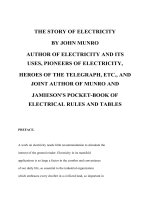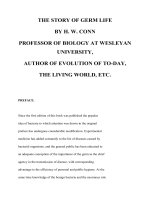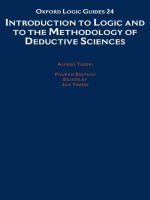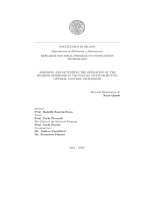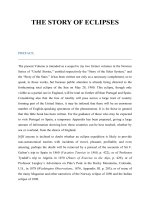- Trang chủ >>
- Khoa Học Tự Nhiên >>
- Vật lý
evangelicals and israel the story of american christian zionism dec 2008
Bạn đang xem bản rút gọn của tài liệu. Xem và tải ngay bản đầy đủ của tài liệu tại đây (1.66 MB, 353 trang )
Evangelicals and Israel
This page intentionally left blank
Evangelicals and Israel
The Story of American Christian Zionism
stephen spector
3
2009
3
Oxford University Press, Inc., publishes works that further
Oxford University’s objective of excellence
in research, scholarship, and education.
Oxford New York
Auckland Cape Town Dar es Salaam Hong Kong Karachi
Kuala Lumpur Madrid Melbourne Mexico City Nairobi
New Delhi Shanghai Taipei Toronto
With offi ces in
Argentina Austria Brazil Chile Czech Republic France Greece
Guatemala Hungary Italy Japan Poland Portugal Singapore
South Korea Switzerland Thailand Turkey Ukraine Vietnam
Copyright © 2009 by Oxford University Press, Inc.
Published by Oxford University Press, Inc.
198 Madison Avenue, New York, New York 10016
www.oup.com
Oxford is a registered trademark of Oxford University Press
All rights reserved. No part of this publication may be reproduced,
stored in a retrieval system, or transmitted, in any form or by any means,
electronic, mechanical, photocopying, recording, or otherwise,
without the prior permission of Oxford University Press.
Library of Congress Cataloging-in-Publication Data
Spector, Stephen, 1946–
Evangelicals and Israel : the story of American Christian Zionism / by Stephen Spector.
p. cm.
Includes bibliographical references and index.
ISBN 978-0-19-536802-4
1 . Christian Zionism—History. 2. Christian Zionism—United States—History.
3. Religion and politics—United States. 4. Islamophobia—United States. I. Title.
DS150.5.S64 2008
320.54095694088'28040973—dc22 2008026681
135798642
Printed in the United States of America
on acid-free paper
Contents
Preface , vii
Abbreviations , xi
1 . “We Are with the Jewish People,” 1
2 . Promise and Prophecy, Love and Remorse:
The Bases of Evangelical Support for Israel, 23
3. The Evangelical Mosaic, 36
4 . The Arab and Muslim Enemy, 50
5. The War with Islam as a Faith , 76
6 . Criticisms of Christian Zionism , 111
7. “It’s My Land and Keep Your Hands Off of It,” 141
8 . God’s Timetable , 158
9 . Prophecy, Policy, and the Unfolding of God’s Plan , 186
10. Christian Zionists, Bush, and the Al-Aqsa Intifada, 212
11. Evangelicals and the Dynamics of George W. Bush’s
Middle East Policy, 234
Notes, 255
Selected Bibliography , 311
Index , 325
This page intentionally left blank
Preface
T
his book is a study of the confl uence of religion and politics in evan-
gelical Christian attitudes toward Israel and the Jewish people. My
goal is to explore Christian Zionists’ convictions with empathy and
respect, though not necessarily with agreement. I am Jewish and I do not
share the fundamental beliefs that lie at the heart of evangelicalism. I have
spent my career studying and teaching Christianity and the Bible, however,
and I try here to represent evangelicals’ views in a way that they will consider
accurate and fair. At the same time, I offer perspectives that contradict and
balance theirs. The issues I address are passionate. The Israeli-Palestinian dis-
pute is one of the most hotly contested questions in the world, freighted with
existential fears and elemental indignation and rage. Adding the conservative
Christian marriage of faith and politics to that dangerous mix heightens the
intensity of the debate.
That is all the more true because many Christian Zionists consider them-
selves to be naturally allied with Jews against a radical Islamist movement bent
on worldwide domination. They cite the Palestinian graffi to “First the Saturday
people, then the Sunday people” to illustrate the global danger that extremist
Muslims pose: jihadists, they assert, plan to conquer Israel and the Jews fi rst,
then the Christians. Especially after 9/11, some prominent evangelical lead-
ers have made assertions about this putative confl ict of civilizations that have
seemed outrageous to many people. I attempt in Chapters 4 and 5 to discover
the theology that underlies this point of view.
The alliance that many born-again Christians offer to Israel and the Jewish
people is astonishing to many Jews. Bible-believing Christians are among the
viii preface
last people whom Jews expect to love, defend, and even idealize them. Polls
have shown just how much the Jewish community distrusts them. In 2004,
when asked to give a “thermometer rating” of their feelings toward groups of
people (from 0 degrees for very cold to 100 for extremely warm), American
Jews gave evangelicals a frigid average rating of twenty-four degrees. More than
one-third of them (37%) rated evangelicals at zero!
1
That stands in startling
contrast to the warmth that the overwhelming majority of American evangeli-
cals feel toward Jews. Their thermometer rating of Jews in 2004 was a balmy
68 degrees. In 2005, 75 percent of them expressed favorable or very favorable
attitudes about Jewish people.
2
John Green, a distinguished senior fellow at the
Pew Forum on Religion and Public Life, notes that white evangelicals’ positive
feelings about Jews have only grown stronger over the last forty years.
3
But
most American Jews haven’t gotten that message. Instead, they see evangelicals
as second only to Muslims in the extent of their anti-Semitism.
4
Much of that
feeling owes to Jews’ general tendency to oppose conservative Christians on
many domestic issues, and to fear the loss of acceptance and opportunity that a
more Christianized society might bring. But very many Jews also are aware of
the unhappy fate that awaits them in classical Christian Zionist eschatology.
Many media reports and books have argued that there is good reason for
Jews to distrust evangelicals. Millions of conservative Protestants, they say,
have a hidden agenda. They may love Jews and support Israel now, but their
true goal is the Jewish people’s conversion to Christianity, and ultimately the
destruction of all the others in the end-times. Moreover, according to many ac-
counts, because these Christian Zionists see current issues through a biblical
lens, they insist that Israel must refuse to give up one inch of the “covenant
land” that God promised to Abraham and his descendants in the book of
Genesis. The Jews must inhabit that land, in this view, in order for Christ to
return. Former president Jimmy Carter succinctly expressed this dark portrait
of those evangelicals: “There’s a fairly substantial and very infl uential group of
Christians” who seek “the complete eradication of any non-Jews from the West
Bank and Gaza, the ultimate coming of Christ, the death or conversion of all
Jews,” said Carter. “That’s what they espouse.”
5
In examining evangelical beliefs, I expected to fi nd a theological rigidity,
especially about the end-times, that issued in political obduracy of the kind
that Carter described. Many commentators have argued, moreover, that these
religious convictions helped defi ne U.S. foreign policy under George W. Bush.
I was prepared to discover that infl uence too. I found instead an unexpected
pragmatism, fl exibility, and nuance in evangelicals. That was true even of many
of the most ardent Christian Zionists. I also found a lot of disagreement and
uncertainty about the end of days. Even born-again leaders who are sure in their
preface ix
convictions and invoke God’s wrath for anyone who divides His Land, never-
theless showed a wholly unanticipated humility about knowing God’s plan.
Bush’s top aides and Israeli prime minister Ariel Sharon found that out when
they asked evangelical leaders how conservative Christians would react if Israel
gave up the Gaza Strip and portions of the West Bank in the hope of achiev-
ing peace. Evangelical leaders assured them that Israel has a right to make its
own mistakes. If the democratically elected government in Jerusalem chose to
commit national suicide, as some of them put it, they would not abandon Bush
or Israel. That does not mean that Christian Zionists have no eschatological
purpose in supporting the Jewish state, as some advocates claim, however. The
issue is too complex and evangelicals are too varied in their beliefs for such
broad generalizations.
One conclusion I reached again and again in this research was that for evan-
gelicals, politics almost always comport with faith. But born-again Christians
are radically individual. Any examination of their beliefs requires a nuanced
understanding of the way that their faith prescribes and accords with policy.
That applies to Bush as well, and to the infl uence that Christian Zionists, and
his own convictions, had on his Middle East policy.
In researching this study, I interviewed evangelical leaders, pastors, and
laity in Jerusalem and the United States. I spoke with offi cers of Jewish organi-
zations and with Israeli and American government offi cials and diplomats.
I attended evangelical worship services and Christian Zionist prayer events
and conferences. I went to meetings between prominent Jews and evangelicals.
I talked with specialists on Christianity, Judaism, and Islam, as well as survey ex-
perts. Several present and former White House advisers gave me their views as
well, mostly off the record. I spoke, too, with people who have known George
W. Bush since childhood, and with some who studied Bible with him. My re-
search is based on what I learned from all of them and from Christian Zionist
books, Web sites, mailings, and other publications. I draw as well on a range of
scholarly studies and newspaper reports. I am grateful to all of those who gave
me their time in interviews, and often in subsequent e-mail correspondence
and phone calls. I especially thank John Green, David Frum, Richard Land,
and the leaders of Eagles Wings for generously sharing their perspectives with
me. I am indebted as well to those who read sections of my manuscript and
made welcome suggestions: Yaakov Ariel, Ethan Felson, Amir Shaviv, Paul
Nussbaum, and Howie Schneider.
I’ve been lucky enough to have as my editor Cynthia Read, whose judg-
ment is invaluable. I am indebted to her, Keith Faivre, Meechal Hoffman, and
the others at Oxford University Press who helped see this book through to
publication.
This page intentionally left blank
Abbreviations
AIPAC American-Israel Public Affairs Committee
BFP Bridges for Peace
CBN The Christian Broadcasting Network
CFI Christian Friends of Israel
CIA Central Intelligence Agency
CUFI Christians United for Israel
DPPJ Day of Prayer for the Peace of Jerusalem
FSU Former Soviet Union
ICEJ International Christian Embassy Jerusalem
IDF Israel Defense Forces
IFCJ International Fellowship of Christians and Jews
ISNA Islamic Society of North America
NAE National Association of Evangelicals
NCLCI National Christian Leadership Conference for Israel
NIE National Intelligence Estimate
NSC National Security Council
PA Palestinian Authority
PFLP Popular Front for the Liberation of Palestine
PLO Palestine Liberation Organization
SBC Southern Baptist Convention
UCI Unity Coalition for Israel
This page intentionally left blank
Evangelicals and Israel
This page intentionally left blank
7
1
“We Are with the Jewish People”
Christian Zionism
“A growing group of us is prepared to lay our lives down for Israel and the
Jewish people,” Robert Stearns told me. That took me by surprise. Robert is
an evangelical Christian pastor from upstate New York and an ardent Zionist.
He had just explained the genesis of his deep personal commitment to Israel.
While living in Jerusalem in the early 1990s, he had told me, he stopped at
a favorite bookstore and fell into conversation with a young Orthodox Jewish
man who was studying Torah and Talmud at a local yeshiva. The student had
a zeal for God. As they spoke, Robert realized that this young man loved the
same patriarchs and prophets that he did. Robert had been reborn in Jesus
Christ and his faith was strong, but praying with this student at the Kotel (the
Western or Wailing Wall), worshipping the same God, triggered a profound
shift in Robert’s spiritual understanding. It confi rmed him on his lifelong jour-
ney. From that moment, Robert dedicated himself to discovering the Jewish
roots of the Christian faith and to learning how he as a Christian was called to
support and defend Israel and the Jewish people.
That was impressive, I thought, but it didn’t explain Robert’s willingness
to die for Israel. Offering his life for the Jewish state was so strong a statement
that it seemed to come from some other place, I told him (probably insensi-
tively). Robert paused for a moment, then replied honestly: “Frankly, I’m very
concerned about the world my son will grow up in.” The danger is Islamic
extremism. The world is changing, Robert told me. Europe is all but lost.
Western values are at stake and Israel represents the front line.
1
In this brief
2 evangelicals and israel
conversation, Robert conveyed much of the essence of evangelical support for
Israel: empathy and pragmatism, deep devotion and a sense of imminent dan-
ger, all grounded in reverence for Scripture. These qualities, and the heartfelt
impulse to cherish the other in oneself, crystallized the wedding of faith and
politics that informs Christian Zionism.
The term “Christian Zionist” is relatively new. It did not come into wide-
spread use until the 1990s, and there is no generally accepted defi nition for
it. It is not in the Oxford English Dictionary. The phrase dates to at least 1903,
when it began to appear in the New York Times, fi rst in letters to the editor and
obituaries, then, twenty years later, in news stories. In 1919, Nahum Sokolow
used it in his History of Zionism
1600–1918
. Writers sometimes cited the term
in the decades that followed, occasionally dismissing it as a less-than-useful
metaphor.
2
In 1967, Claude Duvernoy employed it respectfully in his Le Prince
et le Prophete, offering a bibliography of “Christian Zionist” publications. In
1975, G. Douglas Young, a pro-Israel evangelical, observed in the Jerusalem Post
that some of his co-religionists had accused him of being a “Christian Zionist.”
He thanked them for the compliment.
3
In 1980, the Times reported on a large
Christian Zionist rally in Jerusalem, and by 2003 it used the term to refer to “a
formidable voting bloc of conservative Republicans whose support for Israel is
based on biblical interpretations.”
4
Defi nitions of the term tend to be too narrow or too broad. Church of
Scotland minister Walter Riggans, in his 1988 book, Israel and Zionism,
defi ned a Christian Zionist very inclusively, as any Christian who supports
the Zionist aim of building the state of Israel, its army, government, and
other institutions. He added that the term could apply even more generally,
to any Christian who supports Israel for any reason.
5
Defi ned in that way,
the phrase is so generic that it can denote, for example, liberal Protestants
who sympathize with the Palestinians over the Israelis but who support the
Jewish state’s existence because of guilt over the Holocaust.
6
That defi nition
is too broad for the purposes of the present study, which will analyze a more
specifi cally faith-based Christian Zionism. Donald Wagner, a Presbyterian
minister, professor of religion, and, incidentally, outspoken critic of Chris-
tian Zionism, defi nes it more narrowly, as “a movement within Protestant
fundamentalism that understands the modern state of Israel as the fulfi ll-
ment of Biblical prophecy and thus deserving of political, fi nancial, and reli-
gious support.”
7
That defi nition is incomplete. Many evangelicals and other
Christians who back Israel are not fundamentalists. And although evangeli-
cal Zionists’ beliefs usually are rooted in biblical prophecy, their convictions
and motives, theological and otherwise, are typically far more complex than
that, as we shall see.
“we are with the jewish people” 3
I asked Richard Booker, a Christian Zionist and the author of over twenty
books on Jewish-Christian relations, to defi ne the term. He offered the broadest
understanding, recalling Riggans’: “It applies to every Christian who supports
Israel, though they may not be familiar with the terminology,” he said.
8
Booker,
who is the founding director of the Institute for Hebraic-Christian Studies in
Woodlands, Texas, exemplifi es an especially dedicated variety of Christian
Zionist. In the 1970s, he and his wife fell in love with the God of Israel, who put
the love of the Jewish state in their life. He left a very successful business career
and, with no savings or insurance, set out to educate Christians and Jews about
the need to learn about each other and reach out to one another in love. After
years of struggling, Booker now leads tour groups to Israel, raises money for
Jewish causes, and helps Jews make aliyah (emigration, literally “ascension,” to
Israel). A different kind of Christian Zionist is Ted Haggard, who was the head
of the National Association of Evangelicals until his very public fall from grace
in 2006. Haggard supports Israel, but not because of biblical prophecy, which
he doesn’t believe applies to modern Israel, and not because God put love for
the Jewish state in his heart. Rather, he backs Israel because it is the home to
over fi ve million Jews, and God promised to bless those who bless the Jews
(Genesis 12:3).
9
The term “Christian Zionist” needs to comprehend Booker and
Haggard, and many others as well. I’ll use it here to denote Christians whose
faith, often in concert with other convictions, emotions, and experiences, leads
them to support the modern state of Israel as the Jewish homeland.
10
Robert
Stearns is an excellent example.
Electric Guitars and Shofars
I fi rst met Robert in February 2005, at a conference called “Rend the Heavens,”
at the Calvary Tabernacle in Cranford, New Jersey. The event was sponsored by
Eagles’ Wings, a nondenominational ministry that he founded after his life-
changing experience in Jerusalem. Eagles’ Wings had invited a delegation from
the Israeli consulate in New York to attend the conference, and a young consul
had asked me if I wanted to tag along. It was the fi rst evangelical service that
I, a Jewish man from Long Island, had ever attended and I was a little nerv-
ous. As I entered the tabernacle, I heard Christian rock music emanating from
the sanctuary (which didn’t reduce my anxiety at all). In the large lobby were
tables with Christian books for sale, along with tapes and CDs—but also, as-
tonishingly, shofars (rams’ horns used in Jewish ceremonies)! Then, amazingly,
pretty girls carrying large Israeli fl ags on six-foot-long poles marched from the
lobby into the sanctuary. The sound of electric guitars and drums escaped as
4 evangelicals and israel
the doors opened. I followed them in. Inside the massive room sat and stood
700 evangelical Christians who’d traveled from all around the Northeast to
be there. It was a Sunday evening service and they were mostly in jeans, many
with hands raised in the air, swaying to the music. In the front row were four
men, conspicuous in their dark suits: the delegation from the Israeli consulate.
I joined them with some relief. Now there were fi ve men in dark suits, sitting
stiffl y before a crowd in casual dress who moved with the music and the spirit
that fi lled the room.
Robert stood on the large stage at the front. In his mid-thirties, micro-
phone in hand, smiling confi dently, he looked a little like a rock star. “We’re so
honored tonight to have the new Israeli ambassador,” he said, introducing the
Israeli consul general, Arye Mekel, who sat two seats to my right. Mekel (who
has the title of ambassador) had recently left the Israeli consulate in Atlanta to
head the important one in Manhattan. “Let Ambassador Arye Mekel know we
love him,” Robert called to the congregation and the 700 people in the hall
cheered. “We are with the Jewish people, against the spirit of anti-Semitism!”
Robert declared and the crowd roared, “AMEN!” “Do you want to learn some
Hebrew?” he asked them. The words “ Hinei ma tov uma naim, Shevet achim gam
yachad ” were projected on a large screen onstage in English transliteration,
and the Christians behind us sang them out joyously as the musicians played.
The song, meaning “How good and how pleasant it is for brothers to dwell
together,” is a traditional one in Jewish services and has a sweet, lilting qual-
ity. Some people danced in place while others waved their arms to the rhythm.
Girls walked down the aisles with white banners emblazoned with the biblical
inscription, “ISRAEL, I WILL MAKE YOU A GREAT NATION.” Then the
music changed and the projector put onscreen the words to “ Sholem Aleichem, ”
a high-spirited Hebrew song. Next it switched back to “ Hinei ma tov, ” as hun-
dreds of people danced and clapped with warmth and happiness.
When the singing was over, Robert had everyone cheer us. Then we all sat
and he addressed the congregation, and the fi ve of us in front in particular. “We
fully recognize that there has been a tragic and unspeakable past in the treat-
ment of the Jewish people in Lutheran Germany,” he said in a straightforward
yet confessional tone. The crowd uttered their assent and Robert looked at us
with compassion, maybe even love. “But we recognize that a new generation
has arisen,” he said. “And we have made a solemn pledge: ‘NEVER AGAIN!’ ”
Those are meaningful words to Jews, declaring that we’ve learned a cruel lesson
of history, that we’ll never again be silent as any of our people are slaughtered.
But these were evangelical Christians rising to their feet. They were applaud-
ing enthusiastically as we looked back at them, trying to conceal our amaze-
ment. “That’s right,” they said in agreement. “NEVER AGAIN! Yes, yes.”
“we are with the jewish people” 5
“We stand with the Jewish people because you are the root of our faith,”
Robert declared, and I heard scattered amens behind us. “We know our God
because David stood strong and Esther stood strong!” said Robert. I found out
later that an Israeli deputy foreign minister had suggested to Robert and other
evangelical leaders that, just as God had sent Esther in the Bible to deliver the
Jews from annihilation, conservative Christians had been brought to a position
of power in America for such a time as this. Now, at the mention of Esther’s
name, the people across the hall replied, “Yes! Yes!” “Israel stands as a democ-
racy in a sea of Islamic dictatorships!” Robert told them. “Yes! That’s right!”
came the response. “He has kept his covenant with your people for a thousand
generations!” Robert then said to the fi ve of us. There is a rising anti-Semitism
in Europe right now, he warned, but he assured us that American Christians
will stand with us. Then came a surprise: “We applaud Ariel Sharon’s courage,
his convictions to make hard decisions in order to achieve peace,” he said. That
was unexpected. From everything I’d read, evangelical Christians were dead-
set against Prime Minister Sharon’s plan to disengage from the Gaza Strip and
part of the West Bank. I made a mental note to explore this further.
Next, Robert called Ambassador Mekel up to the stage to speak. Mekel
was accustomed to addressing evangelicals. He often had done so in Atlanta
and the Southeast, so he was comfortable in this setting. “I bring you greetings
from Jerusalem!” he roared. The congregation cheered in response. Mekel then
told them of his birth to a twenty-one-year-old father and a seventeen-year-old
mother, Holocaust survivors who were on a train leaving Russia. I was born on
the fl oor of the train, he said. Luckily a woman passenger had a pair of scissors
and she cut the umbilical cord. I know there are mothers here who wouldn’t
mind at all if nobody had ever cut the umbilical cord with their babies, Mekel
said, smiling. Some people laughed appreciatively.
Robert then called another member of our delegation, Rabbi Gerald
Meister, up to the stage. “Our rabbi of rabbis,” Robert called him affection-
ately. “He danced a little jig coming in, so I suppose he’s Rabbi McMeister,”
Robert joked. Gerald Meister is British, in his sixties. He has his own pulpit
in Brooklyn but also is the Israeli Foreign Ministry’s adviser on Israel-Christian
affairs. The evangelical congregation here in New Jersey already knew him
from his earlier appearances before them. In a sense, he really is their rabbi.
“This guy is a trip,” a man sitting behind me said good-humoredly, perhaps to
no one in particular. It was instantly apparent that Meister is a mesmerizing
speaker. Brilliantly, he seized on Mekel’s story of his birth, using it extempo-
raneously as a metaphor to represent the close spiritual kinship between Chris-
tians and Jews. “God conceived us in the same divine womb,” he declared to
the born-again audience. “We have an umbilical connection. We are the root,
6 evangelicals and israel
you are the branch. The root needs that branch and the branch needs the root.”
The image was from Paul’s Epistle to the Romans, but there are some theologi-
cal problems in this interpretation. Paul says that the Jews have been cut off
from the tree until a remnant will recognize Christ and be grafted back on. I
resolved to return to the rabbi’s imagery later.
The congregation seemed awestruck. “They love you,” I told Meister when
he descended to his seat and rejoined us. “Theater of the absurd,” he joked in
the ironic, self-effacing manner of a British academic. But his dedication to this
group, and theirs to him, was obvious. Our delegation exited through a side
door as the music marked the resumption of the service. Arye Mekel had been
a hit and Rabbi Meister’s eloquence had been dazzling, but as we left I heard
a couple of the organizers say that they’d run a little long. Although these big
events are fi lled with love and joy, they have to be stage-managed carefully.
Mekel and the others from the consulate got into a car and hurried back to New
York and I left as well. But Rabbi Meister stayed behind. These were his people
and he was going to visit with them.
A Plan to Redeem All Mankind through the Jews
The Rend the Heavens conference and my conversation with Robert illustrate
some of the foundational elements of Christian Zionism. Many evangelical
Christians not only support Israel but love it. Some are willing to die for it.
They are adopting Jewish religious customs as their own, recognizing and priz-
ing the Judaic roots of their faith. The high authority with which they endue
Scripture impels them to honor God’s love of the Jews as the apple of His eye.
They affi rm His promises to ingather the Jewish people to their ancient home
in Zion and they rejoice in the fact that this is happening now. They believe
that God, in His love for mankind, has a plan to redeem all peoples through the
Jews. He revealed it millennia ago, in biblical promises and prophesies that are
coming to pass only in our lifetime.
These evangelicals also openly confess their grief, and their guilt, over the
persecution that Christians have infl icted on Jews over the span of centuries.
They are horrifi ed that it was Christians who perpetrated the destruction of
the European Jews in the 1940s. As we shall see, many of them attribute the
Holocaust to Satan, seeing it as a demonic attempt to frustrate God’s provi-
dential design. And Christian Zionists are determined to defend and protect
the Jewish people against their current enemies, the Arabs and Iranians, whom
many of them also see as Satan’s agents. This is not only a matter of religious
conviction. Many evangelical leaders, like Robert, regard Israel as America’s
“we are with the jewish people” 7
crucial ally in a war against Islamic extremists. Israeli offi cials not only accept
this support but solicit and encourage it, as was clear that night in the Calvary
Tabernacle.
The Day of Prayer for the Peace of Jerusalem
Christian Zionism is only one aspect of Eagles’ Wings’ ministry. The organiza-
tion also does outreach to born-again communities, some of them in under-
ground or house churches in places like Honduras, Cuba, and China. But over
the past few years especially, connection to Israel has become a major part of
their mission.
11
Their huge annual project is to organize an international Day
of Prayer for the Peace of Jerusalem (DPPJ), following the commandment in
Psalm 122:6–7: “Pray for the peace of Jerusalem! May they prosper who love
you! Peace be within your walls and security within your towers.”
12
I traveled to Wayne, New Jersey, on a Sunday in October 2005 to attend
that event. On that day, Stearns’s group had arranged for services to pray for
Israel in over 100,000 churches around the word, with coordinators in eighty-
nine nations, including several Muslim countries. Millions of born-again
Christians prayed at once for the peace of Jerusalem. That enormous organiza-
tional achievement makes Robert Stearns a central fi gure in the international
Christian Zionist movement.
The event I attended was in the sanctuary of Calvary Temple, an elegant
space with about a thousand seats. Inside were perhaps 150 people of all ages,
racially and ethnically diverse. For the fi rst thirty minutes, a fi ve-piece band
and piano player, led by a pastor with a booming singing voice and a six-person
choir, rocked and inspired the congregation. Their songs included “The Mighty
One of Israel” and “I Belong to Jesus, Free from Sin.” As I entered the hall, the
audience was jumping up and down to the music, some with arms high in the
air and backs arched. A lone woman danced down the aisle and nobody seemed
to notice. The lyrics were projected high on opposite walls. An Israeli fl ag with
the word Yerushalaim (“Jerusalem”) written in Hebrew script was draped over
the front of the sanctuary.
As the music softened, the mood in this elegant hall became somber, deco-
rous. A woman placed her face in her hands and lowered herself to her seat, cry-
ing. Another glided slowly up behind her, caressing her back gently to comfort
her. A young black woman stood silently in the row in front of me, her head low-
ered. Then the pastor, Thomas Keinath, invited people to welcome each other
and the young woman beamed as she turned to welcome and bless me. Some
people hugged each other. I noticed Rabbi Meister in a large prominent seat up
8 evangelicals and israel
front and off to the right, facing the congregation. I’d chosen to come to Calvary
Tabernacle because he was representing the Israeli consulate here and I wanted to
hear him again. He hadn’t been announced yet and he sat Buddha-like, looking
serene and contemplative. Behind him hung a large, shimmering blue banner
with a drawing of Jerusalem and the legend “Till He makes Jerusalem a praise
in all the earth.”
13
As the ushers discreetly took a collection, a mystical-sounding
taped rendition of “Hatikvah,” the Israeli national anthem, played in the back-
ground. Then a hauntingly lovely song played, beginning with “Dear Yeshua”
(the Hebrew name from which “Jesus” was derived), and continuing with words
taken from Isaiah:
O Jerusalem, Jerusalem, a child wept for you.
For Zion’s sake I will not be silent,
For Zion’s sake, for Yerushalaim
I will not rest, I will not rest.
I’ll set watchmen on the walls, O Jerusalem.
Pastor Thomas addressed us. “We are uniting with churches around the
globe in accordance with the words of David, Psalm 122,” he said and re-
minded us of the reward that awaits those who pray for the peace of Jerusalem.
“We are gathered to pray to the God of Abraham, Isaac, and Jacob, our God,
the one true God,” he said.
Rodlyn Park, an Eagles’ Wings offi cial whom I’d met at the Rend the
Heavens conference, rose to speak. I had interviewed her after that earlier event
and she had told me how the plans were coming along for the DPPJ. The
coordinator from India had said that probably 25,000 churches in his country
would participate. Christians in the nation of Jamaica had heard about it and said
that they would have churches praying as well. Nine to twelve predominantly
Muslim states, including the United Arab Emirates, would join in too, she
said, and Singapore had come on board. Even Palestinians were represented.
A year earlier, at the Feast of Tabernacles, an annual event that evangelicals
celebrate in Jerusalem to mark the Jewish holiday of Succoth, a Palestinian
Baptist pastor from Bethlehem named Naim Khoury had spoken very strongly
in support of Israel, Rodlyn told me. Muslims had bombed his church dozens
of times, he had been shot once, and his brother had been killed, she said. But
Pastor Khoury is a Bible-believing evangelical and he responds to the scriptural
injunctions to bless Israel and to pray for the peace of Jerusalem.
Rodlyn herself grew up in a nonbelieving Gentile home in Philadelphia.
She went to a high school that was 99 percent Jewish, and when her parents
moved away, she lived with a Jewish family for her junior and senior years. At
thirty-two she became a Christian, which is to say she was spiritually reborn
“we are with the jewish people” 9
through a personal experience with Jesus. When she came to her faith, she al-
ready had a deep appreciation of its Jewish roots, but she couldn’t fi nd a church
that shared that view. Then she discovered the Eagles’ Wings ministry and
started to work for Robert, creating a manual that would teach Christians how
to pray for Israel. People who have a heart for the Jewish people often need to be
given a language to express it, she told me. She wanted to help provide that. Is
Eagles’ Wings interested in converting Jews? No, she said. That has given too
much offense and pain to the Jews throughout history. Nor is her organization
motivated by end-of-days theology. Her mission is to defend the Jews, “loving,
speaking the truth even when it’s dangerous,” she said. “I do my job description
and I’ll let God do his.”
14
Now, at the day of prayer event, Rodlyn rose to update the congregation on
the DPPJ worldwide. Over 100,000 fellowships around the globe had prayed
for the peace of Jerusalem that morning, then many people had gathered again
for additional special evening services like this one, she told them.
15
Robert
Stearns and representatives from the Israeli Knesset (parliament) had come
together in Germany to pledge solidarity with Israel as they prayed. Churches
in every state in America, plus Guam and Puerto Rico, had participated.
Eagles’ Wings also had set up a worldwide telephone network and Christians
had called in their prayers from Nigeria, Israel, Egypt, South Africa, Germany,
the United Kingdom, Kenya, and Canada. People had prayed for Jerusalem in
Hebrew, German, and Swahili, as well as English. One woman from Ohio had
blown a shofar over the phone. They were fulfi lling their biblical responsibility,
Rodlyn said, to stand in the gap for Israel and the Jewish people. “Now maybe
God can bless America,” she declared. Rodlyn was referring to a biblical verse
that was so familiar to her audience that she didn’t even need to cite it: Genesis
12:3. In it, God promises Abraham, “I will bless those who bless you and curse
him who curses you.” This prayer vigil, then, like so much of Christian Zion-
ism itself, was inspired by two biblical injunctions, both of which offer rewards
to those who obey them: Psalm 122, which wishes for the prosperity of those
who pray for the peace of Jerusalem, and Genesis 12:3, which offers blessing to
those who bless Israel and the Jewish people. Some people in the congregation
were driven by other motives as well, as we shall see.
Pastor Thomas delivered a brief sermon, which he closed against the sound
of “Hatikva” playing softly in the background. “Breathe, O God,” he said again
and again in soothing tones. “Breathe, O God.” Then he called Rabbi Meister
up to speak.
“For 2,000 years we have never ceased to pray for Zion and for the peace of
Jerusalem,” the rabbi said magisterially. “In 1948, salvation history began to
turn in the direction of the fulfi llment of Scripture, the gathering in of the exiles
10 evangelicals and israel
from the Western world, the Near East, the Far East, and Africa. And you, as
faithful Christians who believed in God’s word as truth, share with us not only
the promise but also the reward: you are to be planted among the righteous.”
The rabbi continued, extemporizing with the beauty and eloquence that
I’d come to expect of him. “Words eternally true and free of error are written
for you in the Scriptures that you carry in your hands and in your hearts,” he
told his Christian listeners. He was invoking the inerrancy of the Bible, one of
the defi ning beliefs of American Protestant fundamentalism. The accuracy and
truth of the Hebrew Bible is also a conviction of devout Jews. “Those are the
only words that ever ring true,” said Meister. He now went on to allude to an-
other core conviction of Christian Zionists and many Jews: that the establish-
ment of the state of Israel and the ingathering of the Jews represent the living
fulfi llment of biblical prophecy. “The gift of the covenant that God granted to
Abraham, Isaac, and Jacob is now being redeemed in contemporary history,” he
said. “All of us are instruments of his words and of his will. To use Christian
signs, we are all called to a special discipleship. An act of fi delity. An act of rec-
ognition that God reigns in Jerusalem. A covenant to which you, by your will
and your faith, attach yourselves indeed.”
The rabbi concluded by speaking of the Jewish people’s gratitude for
Christian support. “We are grateful for it,” he told the congregation, “and we
acknowledge it as a blessing for us all.” This was an important reassurance in view
of American Jews’ widespread distrust of Christian Zionists’ motives. Only weeks
after this event, in fact, several prominent Jewish leaders renewed their attacks on
the Christian right. “And so, as we approach this holy season,” said the rabbi, “we
impart a blessing that Rabbi Abraham Yitzhak HaCohen Kook imparted to his
fl ock in the eternal and most holy city when he said, ‘May the old be renewed and
may the new be made holy.’ ” Meister had used his audience’s spiritual vocabulary
brilliantly, just as they used Hebrew words and Jewish concepts. He had woven
Christian and Jewish theology into his language allusively, elegantly.
When Pastor Thomas spoke again, he was explicit and direct about his re-
ligious conviction. “We believe that we are living in the last days,” he said. The
harvest of souls will take place in these days, he noted. Then, as the piano played
softly in the background, he invited people to come forward and “pray out.”
Rodlyn Park came up fi rst. “Lord, your prophet Isaiah said that there would be
a day when you would set watchmen on the walls of Jerusalem [Isaiah 62:6].
Father, this is that day. And we are those people who have said, ‘Yes, Lord, here
am I.’ We will stand for Jerusalem. We will stand in the gap for the Jewish
people. We will stand in the gap for Israel. We will be those watchmen on the
walls, Lord, whether it’s popular or not. It’s not about what the world thinks.
It’s about what you do, what you’ve asked for, what you’re looking for.”

